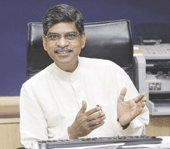Praveer Sinha interviewed Dr. Rajan M. Welukar, vice chancellor of the University of Mumbai (MU) at his office in the Fort campus. Excerpts:
 Mumbai University’s academic reputation has been sliding over the years with acute shortage of faculty, question paper leaks and errors in marks cards becoming normative. To what factors do you attribute MU’s decline?
Mumbai University’s academic reputation has been sliding over the years with acute shortage of faculty, question paper leaks and errors in marks cards becoming normative. To what factors do you attribute MU’s decline?
When I took over as vice chancellor in 2010, no academic bodies were in place. All areas, from teachers, students, to colleges and courses were outdated and needed improvement. I accepted the challenge of addressing the many problems of the university. I admit, of late there have been a few errors. I don’t subscribe to errors, they are unacceptable. But at the same time one has to take into account the vast system of operations and a single person cannot be blamed.
In almost 300 affiliated colleges of mu the offices of principals are vacant, or there are no full-time principals. What’s your comment?
This is not just a problem of Mumbai University and its affiliated colleges, but of all higher education institutions across the country. Most senior academics don’t want to take on additional responsibilities for the same salary or go as principals to semi-urban and rural colleges.
Do you agree mu has been a victim of persistent political interference?
No, I do not believe politics and academics should be mixed. Politics has to be kept out of education; it has no role in academics.
In the World University Rankings published by THE and QS, MU’s ranking has been consistently slipping. Why?
There is an ongoing debate around the world on the issue of ranking higher education institutions. The parameters on which universities are ranked should be uniform. The kind of intellectual capital Harvard University can get with its huge endowment and budgets, even premier Indian institutes such as IIT-Bombay can’t match. Since there is no uniformity in ranking parameters, it’s debatable whether universities should be ranked at all.
The feedback from Indian industry is that mu graduates are not job-ready. What measures has the university taken to improve market confidence in its degrees?
The gap between the education a student receives at university and what is required by industry is a global phenomenon. A university education equips students with general thinking skills and develops each student’s knowledge of a core discipline. The specific skills required by companies are acquired only after exposure to its culture and industry. However, taking into consideration that a university should graduate ‘employable’ youth, the University of Mumbai has made concerted efforts to train students in soft skills and offer professional education. Moreover, we have undertaken a major initiative to involve India Inc with our academic programmes and infrastructure.
Currently only six affiliated colleges of MU have been conferred autonomy. Are there plans to increase this number?
Autonomy will give colleges greater exposure, which they cannot get otherwise. It should be given to help them improve, not reduce MU’s burden. In three years, 20 other colleges affiliated to MU may get autonomy.
With tuition fees frozen and government funds drying up, MU is reeling under a financial crunch…
There is a huge disparity between the functioning of state and Central universities in terms of financial resources. Central universities are established by Acts of Parliament and are campus, not affiliating universities. All Central universities receive development grants in addition to salary and other funds. In contrast, state universities don’t get develop-ment grants, only salary grants. Mumbai University has not received any development grants from the state government in recent times.
In the circumstances we are resorting to marginal fee hikes and also making sure available funds are professionally managed.
Abroad, it’s routine for universities to solicit donations from alumni and industry. What plans has mu drawn up to tap industry/alumni for funds?
We have plans to raise money from industry/alumni for our Thane, Kalyan and Ratnagiri projects. In the past two years, MU has raised Rs.70 crore from industry/alumni — the highest ever for the university. Moreover, we are making presentations to corporates and organisations and have proposed partnerships to upgrade academics as well as infrastructure. Recently, the Thane Municipal Corporation sancti-oned us land for a project, and an alumnus donated Rs.35 crore to build a convention centre on the Kalina campus.
What are your future plans to upgrade and restore Mumbai University to its premier position?
The vision is to take the university to the next level. This implies that all stakeholders of the university must work together to optimise our teaching-learning resources by practicing time, human resource and assets management. There are several issues — quality, research, manpower and governance — on which we need to focus and take corrective steps. But improvement is a continuous process, and it will take time.